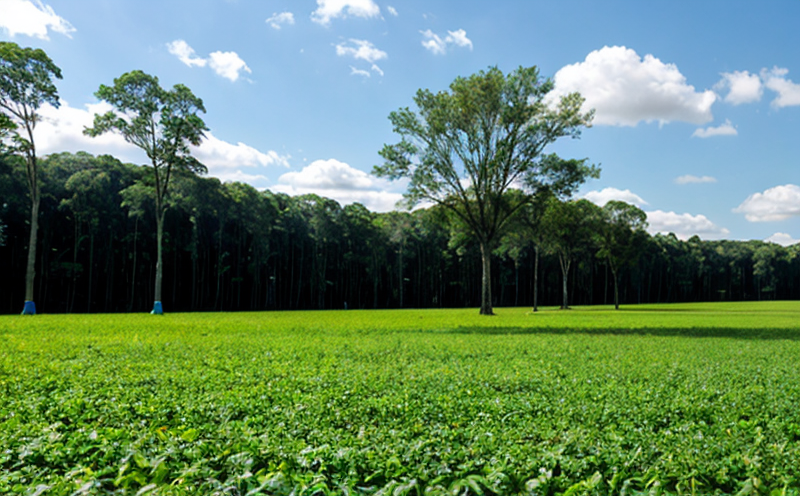Eco-Design Verification Testing of Products
Environmental and sustainability testing plays a critical role in ensuring that products meet regulatory requirements while promoting sustainable practices. One key aspect of this is Eco-Design Verification Testing of Products, which focuses on verifying whether the environmental impacts of consumer products have been minimized throughout their life cycle, from design to disposal.
The Eco-Design Directive (EU) 2009/125/EC aims to reduce the environmental impact of products by setting ecodesign requirements. Compliance with these regulations is essential for manufacturers and importers to avoid penalties and maintain market access. Our service provides comprehensive verification testing that ensures your products meet all relevant standards.
Eco-Design Verification Testing involves a series of assessments aimed at evaluating the energy efficiency, resource use, and environmental impacts associated with the product's manufacturing process, usage phase, and end-of-life disposal. This includes identifying opportunities for reducing the product’s carbon footprint, water consumption, and waste generation. By conducting thorough testing, we help you ensure that your products comply with ISO 14025:2017, which provides guidelines on the principles and procedures of life cycle assessment (LCA).
Our team uses advanced instrumentation and methodologies to assess various parameters such as energy consumption during manufacturing, water use in production processes, emissions from raw materials extraction, and recycling rates. We also consider the product's entire lifecycle, including transportation, end-of-life management, and disposal methods. This holistic approach ensures a comprehensive evaluation of your product’s environmental impact.
Real-world applications of Eco-Design Verification Testing include:
- Evaluating the energy efficiency of electronic devices
- Assessing the recyclability and biodegradability of packaging materials
- Determining the environmental impact of construction materials during their manufacturing process
- Measuring the water usage in textile production processes
The testing process begins with a detailed review of your product’s design, manufacturing processes, and end-of-life disposal methods. We then conduct laboratory tests to measure specific parameters such as energy consumption, material composition, and emissions. Our reports provide actionable insights that you can use to improve the environmental performance of your products.
Our expertise lies in providing accurate, reliable, and timely testing results. Compliance with Eco-Design standards is crucial for maintaining market access and avoiding costly penalties. By partnering with us, you ensure that your products are not only compliant but also environmentally responsible.
| Applied Standards |
|---|
| ISO 14025:2017 - Life Cycle Assessment (LCA) |
| EC Directive 2009/125/EC - Eco-Design of Energy-related Products |
| EN ISO 18963:2004 - Sustainability in Design |
| ASTM E2792:2020 - Life Cycle Assessment for Consumer Goods |
In conclusion, Eco-Design Verification Testing is essential for ensuring that your products meet the highest environmental standards. Our service provides you with the necessary tools and expertise to comply with regulatory requirements while promoting sustainable practices.
Applied Standards
| Standard Name | Description |
|---|---|
| ISO 14025:2017 - Life Cycle Assessment (LCA) | This standard provides guidelines on the principles and procedures for life cycle assessment. It is used to evaluate the environmental impacts of a product throughout its lifecycle. |
| EC Directive 2009/125/EC - Eco-Design of Energy-related Products | The directive sets ecodesign requirements for energy-related products, including household appliances and lighting. Compliance with this regulation is mandatory to ensure environmental performance. |
| EN ISO 18963:2004 - Sustainability in Design | This standard focuses on the principles of sustainable design, covering aspects such as energy efficiency, material selection, and end-of-life management. |
| ASTM E2792:2020 - Life Cycle Assessment for Consumer Goods | An ASTM standard that provides a framework for conducting life cycle assessments on consumer goods. It is widely used in the industry to evaluate environmental impacts. |
The combination of these standards ensures comprehensive and accurate evaluation of your product's environmental impact, helping you achieve compliance with regulatory requirements while promoting sustainability.
Industry Applications
- Consumer Electronics: Testing the energy efficiency and recyclability of electronic devices such as smartphones, laptops, and televisions.
- Clothing & Apparel: Evaluating the water usage in textile production processes to reduce environmental impact.
- Housing Construction: Assessing the environmental impact of construction materials during manufacturing and transportation.
- Packaging: Determining the recyclability and biodegradability of packaging materials, ensuring minimal waste at end-of-life disposal.
Eco-Design Verification Testing is particularly relevant for industries where product sustainability is a growing concern. By identifying opportunities to reduce environmental impact, you can enhance your brand's reputation and appeal to environmentally conscious consumers. Our service helps you stay ahead of regulatory changes and market trends by providing cutting-edge testing solutions.
Quality and Reliability Assurance
- Compliance with Regulatory Requirements: Ensuring that your products meet all relevant environmental standards, including the Eco-Design Directive.
- Minimized Environmental Impact: Identifying ways to reduce energy consumption, water usage, and waste generation throughout the product lifecycle.
Eco-Design Verification Testing provides you with detailed reports that outline areas for improvement. By addressing these issues early in the design process, you can ensure that your products are both environmentally responsible and reliable. Our service also helps you stay ahead of future regulatory changes by providing ongoing support and guidance on best practices.





